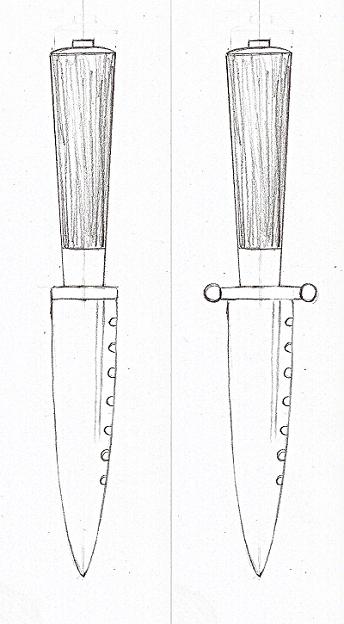Posts: 25 Location: Virginia
Thu 12 Jan, 2017 1:09 pm
The who, when, and where is important. You say something to go along with your targe so I’m assuming you are portraying a highlander. Is that correct? Are you portraying a highland transplant to North America? However, you also mention trade knives – The link that was posted from the frontier forum contains what is probably the most comprehensive information concerning the 18th century trade/butcher/scalper (different marketing terms for the same tool). I started this thread to show what a good reproduction looks like
http://myArmoury.com/talk/viewtopic.php?p=286...t=#286883. My primary area of interest is 18th century English colonies, so I’m not as well-versed in what the Highlanders might be carrying I am familiar with Jeff White’s knives. They are fairly popular in some 18th century reenacting circles (because they’re good knives and priced very reasonably), however, they don’t represent the true period trade knife for English, French, Dutch, or anything I’m familiar with. Again, good knives, but not a true trade knife. There has been many discussions in living history/archeology circles about what a “homespun” knife would look like in the period, because certainly there was such a thing. The reality is that the vast majority of knives in 18th century Europe and European America (including North American Indians) had quality, readily available knives (both fixed blade and folding) produced commercially in places like Sheffield then traded all over the world.
Another reason why the who, when, and where is important is because only a limited amount of European and North American folks would have been carrying knives on belts in the period (or wearing belts at all). Highlanders may be some of the few exceptions in Europe and Highland transplants to North America generally followed social norms with short-lived exceptions in places like Georgia and North Carolina (think those who fought at Moore’s Creek Bridge). During the War for Independence, riflemen and backcountry “over the mountain men” are described as carrying scalpers (butchers/trade knives) on belts and of course Eastern Indian tribes carried French or English trade scalpers. The only other real non-conjectural option for “belt knives” in North America at the time would have been table knives with the rounded tips ground down to a point. Homespun knives may have been made by local blacksmiths (they certainly were in the 19th century), but it would have made little economic sense given that trade knives were so cheap and available. The same principle applies to gunsmiths in the colonies – masters would have been capable of making lock, stock, and barrel, but it was so much easier and cost effective to use commercially available locks and barrels, etc.
For spot-on trade knives, Ken Hamilton’s knives run around the $100 or so mark, but are the best reproductions out there. Kyle Willyard, whom you mentioned also makes trade knife repros though his fit and finish is actually better than the originals and they’re priced a bit higher. He also uses his own touch mark rather than an original. He makes fantastic stuff. Eric Schatzel of “At the Eastern Door” also reproduces fantastic repros.
